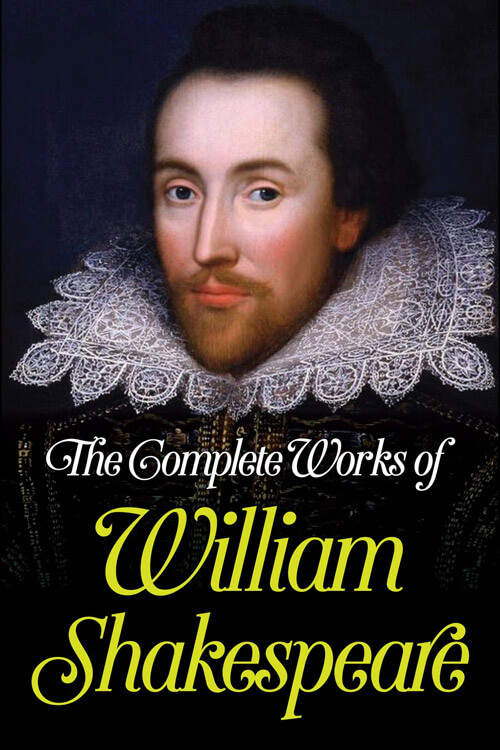
The Complete Works of William Shakespeare
The Complete Works of William Shakespeare is the standard name given to any volume containing all the plays and poems of William Shakespeare. Some editions include several works that were not entirely of Shakespeare’s authorship (collaborative writings), such as The Two Noble Kinsmen, which was a collaboration with John Fletcher; Pericles, Prince of Tyre, the first two acts of which were likely written by George Wilkins; or Edward III, whose authorship is disputed. The various editions of the Complete Works include several university press releases and versions released from larger publishing companies.
The Complete Works (especially in older editions) are often sought after by book collectors, and several binderies and publishing houses have produced leather-bound and gilded releases for luxury book collecting. Both mainstream and academic publishing companies have released multiple editions and versions of their collections of Shakespeare’s work, often updated periodically. Multiple editors contribute to laying out the Complete Works; usually, the main editor, publishing company or university’s name is included in the title. (For instance, the Complete Works published by the Arden company is often referred to as the Arden Shakespeare, and the edition produced by Yale University is called the Yale Shakespeare.)
Read or download Book
William Shakespeare
William Shakespeare (April 1564 – 23 April 1616) was an English playwright, poet, and actor.
Biography
He is widely regarded as the most excellent writer in the English language and the world’s pre-eminent dramatist. He is often called England’s national poet and the “Bard of Avon” (or simply “the Bard”). His extant works, including collaborations, consist of some 39 plays, 154 sonnets, three long narrative poems, and a few other verses, some of uncertain authorship. His plays have been translated into every primary living language and are performed more often than those of any other playwright. Shakespeare remains arguably the most influential writer in the English language, and his works continue to be studied and reinterpreted. Shakespeare was born and raised in Stratford-upon-Avon, Warwickshire.
At 18, he married Anne Hathaway, with whom he had three children: Susanna and twins Hamnet and Judith. Sometime between 1585 and 1592, he began a successful career in London as an actor, writer, and part-owner (sharer) of a playing company called the Lord Chamberlain’s Men, later known as the King’s Men. At age 49 (around 1613), he appears to have retired to Stratford, where he died three years later. Few records of Shakespeare’s private life survive; this has stimulated considerable speculation about his physical appearance, his sexuality, his religious beliefs, and whether others wrote the works attributed to him. Shakespeare produced most of his known works between 1589 and 1613. His early plays were primarily comedies and histories and are regarded as some of the best works produced in these genres. He then wrote mainly tragedies until 1608, including Hamlet, Romeo and Juliet, Othello, King Lear, and Macbeth, all considered among the finest English works.
In the last phase of his life, he wrote tragicomedies (also known as romances) and collaborated with other playwrights. Many of Shakespeare’s plays were published in editions of varying quality and accuracy during his lifetime. However, in 1623, John Heminges and Henry Condell, two fellow actors and friends of Shakespeare’s, published a more definitive text known as the First Folio, a posthumous collected edition of Shakespeare’s dramatic works that includes 36 of his plays. Its Preface was a visionary poem by Ben Jonson, a former rival of Shakespeare, who hailed Shakespeare with the now famous epithet: “not of an age, but for all time”.






